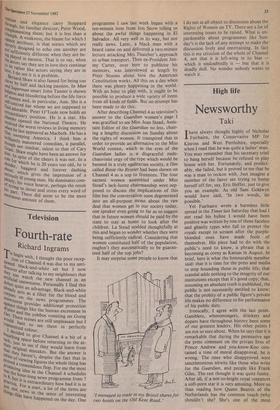Television
Fourth-rate
Richard Ingrams
10 begin with, I thought the poor recep- qu tion of Channel 4 was due to my anti- di ated black-and-white set but I now tsenver after talking to my neighbours that tip° watch the new channel in an :fcplileial snowstorm. Personally I find this eet quite an advantage. Black-and-white enreadY acts as a filter for the blood and „'I-Pses on the news programmes. The 4anowstorm provides additional protection against things like the human excrement in °alter and the yobbos vomiting on Going Wolit. These scenes are still unpleasant but I uld hate to see them in P transmitted •■tted colour. perfectly brl decided to give Channel 4 a bit of a tacei,athing space before returning to the at- th-lc just to see if they would learn from that t,°riginal mistakes. But the answer is L"eY haven't, despite the fact that in proved of viewing figures the whole thing has pr°ved a tremendous flop. For me the most w,,,ising idea in the Channel 4 schedules tne hour-long news programme from 7 o'r 6, but it is extraordinary how bad it is in ju,actice. For a start, a lot of the items are things that have happened on the day. One
programme I saw last week began with a ten-minute item from Jon Snow telling us about the awful things happening in El Salvador. All very well in its way, but not really news. Later, a black man with a beard came on and delivered a two-minute lecture attacking Mrs Thatcher's approach to urban transport. Then ex-President Jim- my Carter, over here to publicise his memoirs, was interviewed at length by Peter Sissons about how the American Constitution works. All this on a day when there was plenty happening in the world. With an hour to play with, it ought to be possible to produce a wide variety of items from all kinds of fields. But no attempt has been made to do this. •
After describing Channel 4 as television's answer to the Guardian women's page I was gratified to see Miss Jean Stead, Assis- tant Editor of the Guardian no less, chair- ing a lengthy discussion on Sunday about the rights of women. It transpired that in order to provide an alternative to the Miss World contest, which in the eyes of the Guardian ladies is a disgraceful male- chauvinist orgy of the type which would be banned in a truly egalitarian society, a film called Rosie the Riveter had been shown on Channel 4 as a sop to feminists. The four earnest women assembled under Miss Stead's lack-lustre chairmanship were sup- posed to discuss the implications of this film but the conversation soon degenerated into an all-purpose moan about the raw deal that women get in our society today, one speaker even going so far as to suggest that in future women should be paid by the state to stay at home to look after the children. La Stead nodded thoughtfully at this and began to wonder whether they were being sufficiently radical. Considering that women constituted half of the population, oughtn't they automatically to be guaran- teed half of the top jobs?
It may surprise some people to know that 'I managed to trade in my Britoil shares for two hotels on the Old Kent Road.' I do not at all object to discussion about the Rights of Women on TV. There are a lot of interesting issues to be raised. What is un- pardonable about programmes like Sun- day's is the lack of any attempt to make the discussion lively and entertaining. In fact this is my criticism of the whole of Channel 4, not that it is left-wing in its bias which it undoubtedly is — but that it is deadly dull. No wonder nobody wants to watch it.










































 Previous page
Previous page